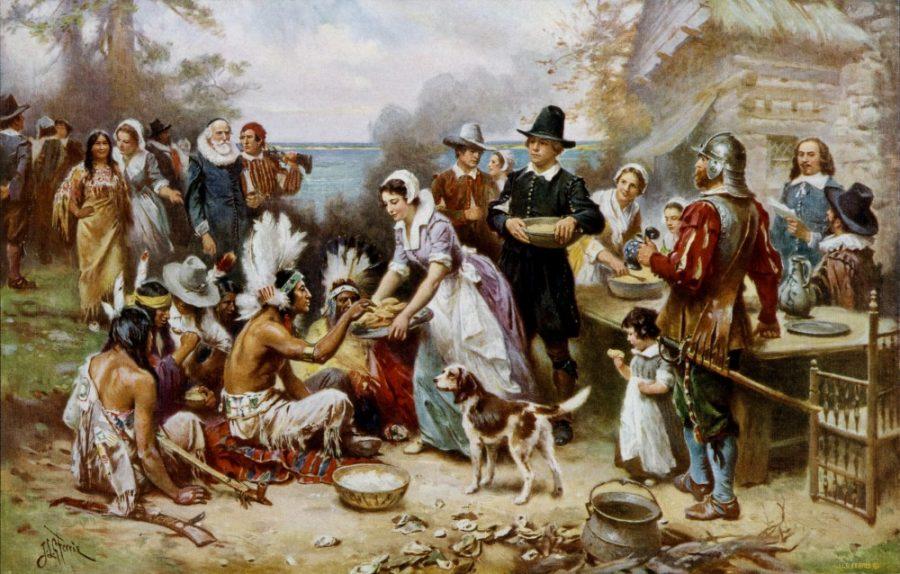Of all the holidays we have, Thanksgiving is my absolute favorite. Why? Because it is the one holiday we have, in my opinion, that doesn’t focus on the materialism that is so prevalent in a capitalist society. I can focus on the love of my family and all the blessings I have been given. But where did Thanksgiving come from?
The first Thanksgiving occurred in November 1621 after the first successful harvest by the new colonists on Plymouth, Mass., with the help of local Native Americans who were their allies. Over the centuries, Thanksgiving has become more prominent as a holiday in our society, with President Lincoln making it an official holiday in 1863.
We learn about the “First Thanksgiving” as school children with the alliance between the Mayflower settlers and Squanto and his people; we have our Thanksgiving traditions of turkey, pumpkin pie and football, and we don’t typically think about how this holiday began. While the story of the first Thanksgiving may hold some truth, history is never as picturesque as we paint it, especially when we tell it to children.
RELATED: Film Student explores immigrant’s first Thanksgiving
What we forget to remember, or what we choose to forget, is what lies behind the curtain: the genocide of a people, taking the land from those deemed unworthy, making treaties and breaking them, taking resources and growing like a cancer. That is the harsh reality of our roles as colonizers. We’ve grown up with the idea of Manifest Destiny, that it is our destiny to expand and make our own path, which justifies these actions, but how can we reasonably justify murdering millions of people just because they are deemed “savages” or “uncivilized”?
Early news coverage of Native Americans paints a conflicting picture, from the noble, free-spirited Indian to the savage, blood-thirsty Indian. It all depended on what was needed to justify the actions of the people writing. How is that fair, or right?
Today, it is not uncommon to see tribal members, and even non-tribal citizens, reclaiming holidays like Thanksgiving or Columbus Day, though I won’t throw that as a blanket statement that every tribal member will fall under. For those that do, why should they be asked to celebrate holidays that have brought so much pain and suffering to their people? If we have any compassion at all, we won’t ask them to. In fact, support their cause just as much as we support #MeToo and #BlackLivesMatter. In Plymouth, Mass., some gather in observance of the National Day of Mourning in place of Thanksgiving as a way to “remember their ancestors and grieve their genocide.”
RELATED: ANALYSIS: What the end of Affirmative Action could look like
The subjugation these people have endured has not ended, which is the sad truth. While racism and white privilege runs rampant through our nation’s history, the younger generations strive to create a better world, to learn from the mistakes of our forefathers, but it would do us no good to forget what came before. Activism is becoming an everyday aspect of our lives and it’s a trend that needs to continue. We made a stand at Standing Rock against a pipeline that could ruin a water supply and disturb ancestral burial grounds. We marched on Washington in support of women’s rights and stricter gun control after the Parkland High School shooting. We are learning to come together and stand as one. If nothing else, the act of doing so when we come from such diverse backgrounds is a reason to be thankful and give us hope – it is not outside the realm of possibility to put aside our differences and do what is right.
So, here is what I suggest: Let us all redefine what Thanksgiving means. Let us rewrite history to reflect the truth and begin a new chapter – one that reflects how we celebrate Thanksgiving now. Now we have the Macy’s Thanksgiving Day parade, football, dinner with friends and family. Some people go out and volunteer on Thanksgiving.
This year we have the chance to make a change. It is our time to begin writing the first chapters of our future. What legacy will we leave behind?
Alexis Richardson is a graduate student in journalism ready for some quality time with her family. Follow Alexis on Twitter









